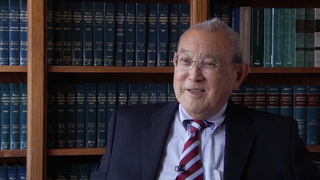Interviews
Identity crisis (Spanish)
(Spanish) Well, in my case, for example, in Argentina, above all among Nisei, identity has always been a topic of discussion. “What are we? Who are we?” Whether we are Japanese or Argentine. Generally…We Nikkei always have this identity crisis, usually as adolescents or young people, where we don’t quite know where we belong.
In my case, fortunately in my case, since I lived in an Argentine community that had a lot of Japanese as well, and in which the Argentines accepted the Japanese, I didn’t feel that difference or discrimination that maybe others have felt. In that sense I feel lucky because I didn’t have that bad experience that others have probably had.
But I know that other people like me, of my generation, have not had an easy time. And then there are certain other people who seemed to prefer…they went to Japan and they felt better in Japan than in Argentina, which is their country of birth. In my case, I feel very comfortable in Argentina, I’m just another Argentine. In Japan, sometimes I feel like a foreigner but I then other times I feel Japanese. But I know that I’m an Argentine with Japanese blood and with a certain…with a Japanese background.
Date: October 7, 2005
Location: California, US
Interviewer: Ann Kaneko
Contributed by: Watase Media Arts Center, Japanese American National Museum
Explore More Videos




Postwar school-life
(b. 1930) Half Japanese and grew up in both Japan and the United States.

On Challenging Institutions
(1938-2020) Japanese American attorney and civil rights activist

Pop and Balls
(1938-2020) Japanese American attorney and civil rights activist

Re-examining Identity
(1941-2018) Japanese Canadian photojournalist and activist

Being Denied as a Japanese American Lawyer
(b. 1934) The First Japanese American Appointed to the U.S. Court of Appeals.



Conflicted about immigrating to America (Japanese)
(b. 1925) War bride


Defining "Nikkei"
(1941-2018) Japanese Canadian photojournalist and activist

Discrimination faced in San Francisco (Japanese)
(b. 1937) A war bride from Yokohama

Accepted by Japanese society as I learned more Japanese (Japanese)
(b. 1979) Sansei Nikkei Brazilian who lives in Oizumi-machi in Gunma prefecture. He runs his own design studio.
